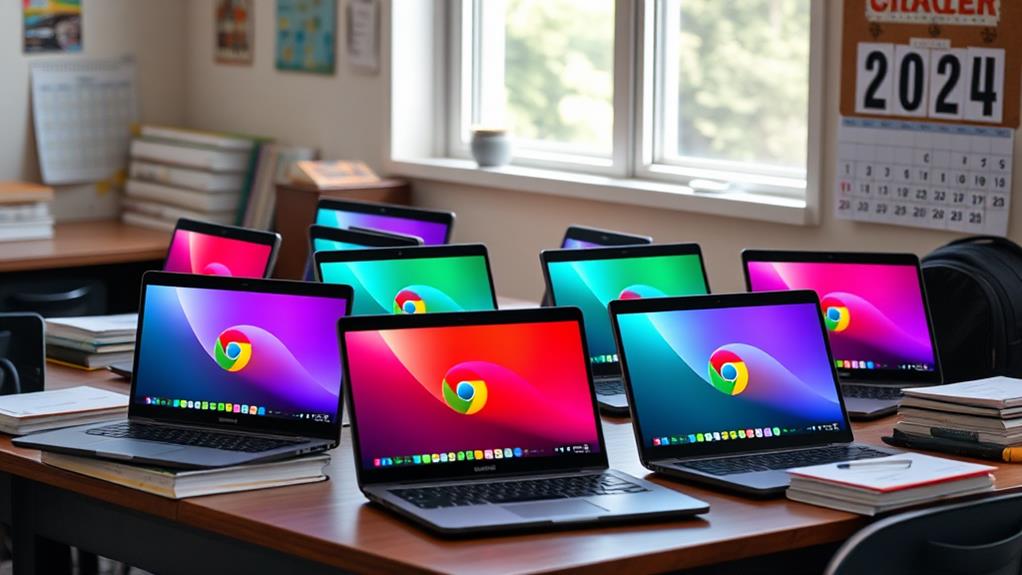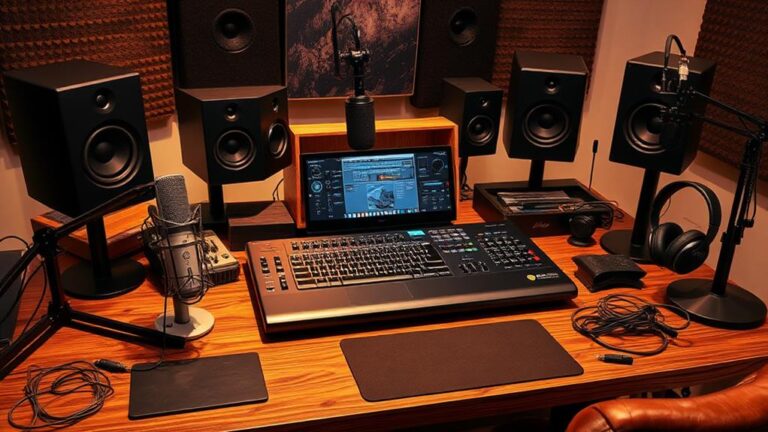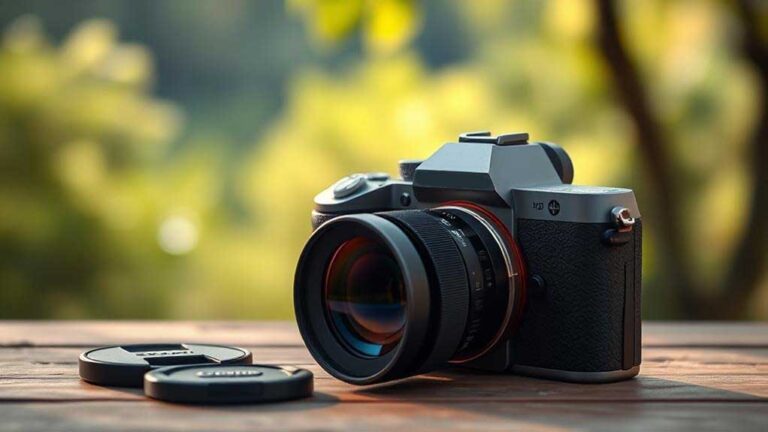Links below are affiliate links. We earn a commission on purchases at no extra cost to you. Although our opinions are based on curated research, we have not used these products. Article generated with AI.
In 2025, students have several affordable and powerful Chromebook options. The HP 2023 Chromebook Laptop offers a 14-inch display with Intel Celeron N4120 processor and up to 128GB storage. HP’s 14-inch Chromebook with Intel Quad-Core N4120 boasts a 14-hour battery life.
ASUS Chromebook CM14 features a versatile 360° hinge and military-grade durability. The Acer Chromebook Spin 311 provides a lightweight, convertible design with a touchscreen.
When choosing a Chromebook, consider factors like processing power, battery life, portability, display quality, storage capacity, connectivity options, and build durability.
These devices balance performance and affordability, making them ideal for educational use. Further exploration will reveal additional features and benefits of each model
Highlights
- HP Chromebooks offer affordable options with up to 14-hour battery life and Intel Celeron processors for smooth performance.
- ASUS Chromebook CM14 features a versatile 360° hinge, military-grade durability, and supports USI stylus for enhanced note-taking.
- Acer Chromebook Spin 311 provides a lightweight, convertible design with a touchscreen and up to 10 hours of battery life.
- Look for Chromebooks with at least 4GB RAM, 64GB storage, and Intel Celeron N4000 series or higher processors for optimal student use.
- Consider models with multiple USB ports, HDMI output, and Wi-Fi 5/6 support for better connectivity and compatibility with external devices.
HP 2023 Chromebook Laptop (14 Inch, Intel Celeron N4120)
HP 2023 Chromebook Laptop
The HP 2023 Newest Chromebook Laptop is a sleek and powerful device designed to elevate your computing experience. With its 14-inch display, Intel Celeron N4120 processor, and impressive battery life, it seamlessly combines performance and portability for both work and play..
For students seeking an affordable and reliable Chromebook, the HP 2023 Chromebook Laptop stands out as a solid contender. This 14-inch device features an Intel Celeron N4120 processor, capable of turbo boosting up to 2.6 GHz, paired with up to 4GB of DDR4 RAM for smooth multitasking. The Chrome OS operating system guarantees a user-friendly experience, while the integrated Intel UHD Graphics 600 handles basic visual tasks. You’ll find ample connectivity options, including Wi-Fi 5, Bluetooth, and various ports such as HDMI and USB 3.0. With up to 128GB of eMMC storage and an average battery life of 9 hours, this Chromebook balances portability and functionality. Its compact dimensions and lightweight design (3.35 pounds) make it an ideal choice for students on the go.
Best For: Students and casual users seeking an affordable, lightweight Chromebook for basic computing tasks, web browsing, and online productivity.
Pros:
- Long battery life of up to 9 hours for all-day use
- Lightweight design at 3.35 pounds, making it highly portable
- Adequate connectivity options with multiple USB ports and HDMI output
Cons:
- Limited storage capacity with up to 128GB eMMC
- The low-resolution display (1366 x 768) may not be ideal for multimedia tasks
- 4GB RAM might struggle with heavy multitasking or resource-intensive applications
HP 14-inch Chromebook with Intel Quad-Core N4120
HP 14-inch Chromebook with Intel Quad-Core N4120
Introducing the HP Newest 14 HD Chromebook Laptop, where performance meets portability in a sleek design. Powered by an Intel Quad-Core N4120 processor, this lightweight device boasts 4GB of RAM, a brilliant 14-inch HD display, and an impressive 14-hour battery life, making it perfect for both everyday tasks and on-the-go productivity.
Students seeking a reliable, budget-friendly Chromebook will find the HP 14-inch model with Intel Quad-Core N4120 processor an excellent choice. This lightweight device, weighing just 3.35 pounds, offers a 14-inch HD display with 1366 x 768 resolution. It’s equipped with 4GB DDR4 RAM and 64GB eMMC storage, providing ample space for schoolwork and basic applications.
The Chromebook boasts an impressive 14-hour battery life, ensuring you can work through a full day of classes without needing to recharge. It runs on Chrome OS, which is known for its quick boot times and seamless integration with Google services. While it may have limitations compared to full-fledged laptops, it’s well-suited for common student tasks like web browsing, document editing, and video streaming. The inclusion of HDMI and USB ports, both Type-A and Type-C, enhances connectivity options for various peripherals and external displays.
Best For: Students and casual users seeking an affordable, lightweight Chromebook for basic computing tasks, web browsing, and Google services integration.
Pros:
- Long battery life of 14 hours for all-day use
- Lightweight design at 3.35 pounds for easy portability
- Quick boot times and seamless integration with Google services
Cons:
- Limited storage capacity with only 64GB eMMC
- Lower screen resolution (1366 x 768) compared to Full HD displays
- Restricted functionality compared to full-fledged laptops due to Chrome OS limitations
HP Chromebook 14 Laptop (14a-na0226nr, 2022)
HP Chromebook 14 Laptop (14a-na0226nr, 2022)
The HP Chromebook 14 Laptop (14a-na0226nr) is your ultimate companion for seamless productivity and entertainment, featuring a powerful Intel Celeron N4120 processor paired with 4 GB DDR4 RAM and 64 GB of eMMC storage. With a stunning 14-inch HD anti-glare display and an incredible battery life of up to 14 hours, this lightweight laptop is perfect for students, professionals, and content creators on the go.
Boasting up to 14 hours of battery life, the HP Chromebook 14 Laptop (14a-na0226nr, 2022) is an excellent choice for students who need all-day productivity. This lightweight device, weighing just 3.24 pounds, features a 14-inch HD anti-glare screen and an Intel Celeron N4120 processor. With 4 GB of RAM and 64 GB of eMMC storage, it’s capable of handling multiple tasks and windows simultaneously.
You’ll find the HP Chromebook 14 well-equipped for connectivity, sporting Wi-Fi, Bluetooth, three USB 3.0 ports, and an HDMI port. The laptop’s custom-tuned stereo speakers enhance your audio experience, while the HP Imagepad with multi-touch support improves navigation. Its ENERGY STAR certification and EPEAT Silver registration demonstrate HP’s commitment to sustainability, making this Chromebook an environmentally conscious choice for eco-minded students.
Best For: Students and casual users seeking an affordable, lightweight laptop with long battery life for basic computing tasks and web browsing.
Pros:
- Impressive battery life of up to 14 hours
- Lightweight and portable design at just 3.24 pounds
- Fast charging capability (0 to 50% in approximately 45 minutes)
Cons:
- Limited storage capacity with only 64 GB eMMC
- Low-resolution display (1366 x 768)
- 4 GB RAM may be insufficient for more demanding tasks or heavy multitasking
ASUS Chromebook CM14 Laptop (CM1402CM2A-DS44)
ASUS Chromebook CM14 Laptop (CM1402CM2A-DS44)
The ASUS Chromebook CM14 is a versatile laptop featuring a 14-inch HD anti-glare display and a robust MediaTek Kompanio 520 processor, ideal for both personal and professional use. With its 360° hinge, spill-resistant keyboard, and impressive battery life of up to 14 hours, it empowers users to seamlessly tackle web browsing, video calls, and productivity tasks on the go.
Durability meets flexibility in the ASUS Chromebook CM14 Laptop, making it an ideal choice for students who need a reliable device that can withstand daily wear and tear. This 14-inch laptop boasts a 360° hinge, allowing for versatile use as a tablet or traditional laptop. It’s built to military-grade standards (MIL-STD 810H) and features a spill-resistant keyboard, protecting against accidental liquid damage up to 13 ounces.
The CM14 runs on ChromeOS, offering easy access to apps and a stable operating system. With its MediaTek Kompanio 520 processor, 4GB of RAM, and 64GB of storage, it’s well-suited for web browsing, video calls, and general productivity tasks. The laptop’s 14-hour battery life guarantees all-day use without frequent charging. Additionally, it supports a USI stylus for intuitive writing and note-taking, enhancing its functionality for students in various academic settings.
Best For: Students and budget-conscious users seeking a durable, versatile Chromebook with long battery life and military-grade build quality for everyday tasks and light productivity.
Pros:
- Military-grade durability (MIL-STD 810H) with spill-resistant keyboard and 360° hinge
- Long battery life of up to 14 hours for all-day use
- Lightweight and portable design with antimicrobial protection
Cons:
- Limited storage capacity (64GB eMMC) may not be sufficient for some users
- Lower resolution display (1366×768) compared to Full HD alternatives
- Some users report issues with Wi-Fi sensitivity and touchpad responsiveness
Acer Chromebook Spin 311 Convertible Laptop (CP311-2H-C679)
Acer Chromebook Spin 311 Convertible Laptop (CP311-2H-C679)
The Acer Chromebook Spin 311 Convertible Laptop is the ultimate blend of affordability and functionality, boasting an 11.6″ HD Touch IPS display and a powerful Intel Celeron N4020 processor. With a lightweight design, long battery life, and versatile 360° hinge, it’s perfect for students and professionals seeking a reliable device for everyday tasks.
…
For budget-conscious learners seeking versatility, the Acer Chromebook Spin 311 Convertible Laptop (CP311-2H-C679) stands out as a top contender. This lightweight device, weighing just 2.62 lbs, features an 11.6″ HD touchscreen with Antimicrobial Corning Gorilla Glass. It’s powered by an Intel Celeron N4020 processor and 4GB of RAM, providing smooth performance for web browsing and basic tasks. The Chromebook Spin 311 offers a convertible design, allowing you to use it as a laptop or tablet. With up to 10 hours of battery life, it’s ideal for all-day use in classrooms or libraries. Chrome OS guarantees built-in virus protection and automatic updates, while access to the Google Play Store expands its functionality. However, the 32GB internal storage is limited, and the 1366×768 screen resolution may not satisfy all users.
Best For: Budget-conscious students and casual users seeking a versatile, lightweight Chromebook for basic tasks and web browsing.
Pros:
- Convertible design with touchscreen functionality
- Long battery life of up to 10 hours
- Lightweight and portable at 2.62 lbs
Cons:
- Limited internal storage of 32GB
- Low screen resolution (1366×768)
- Average camera quality
Factors to Consider When Choosing Chromebooks for Students

When choosing a Chromebook for students in 2024, you’ll need to weigh several key factors. Consider the device’s performance and processing power, which affect its ability to handle multiple tasks and run educational apps smoothly. You’ll also want to evaluate battery life, portability, display quality, and storage options, as these features impact the Chromebook’s usability for students’ daily academic needs.
Performance and Processing Power
As students engage in digital learning, performance and processing power become essential factors in choosing the right Chromebook. When selecting a device, you’ll want to look for a model with at least an Intel Celeron N4000 series processor or higher. This level of processing power guarantees smooth performance for common tasks like web browsing and multitasking. Additionally, aim for a Chromebook with a minimum of 4GB of RAM, which allows for efficient operation when running multiple applications or browser tabs simultaneously.
Some Chromebooks feature a turbo boost capability, temporarily increasing processor speed during demanding tasks. This can enhance your experience during peak usage periods. Storage capacity also affects performance, with 64GB eMMC being sufficient for basic needs. However, if you plan to store more files locally, think about a model with 128GB of storage. Battery life is another vital aspect to evaluate. Look for Chromebooks offering at least 10 hours of battery life, guaranteeing you can get through a full day of classes and study sessions without needing to recharge. These performance factors will help you choose a Chromebook that meets your academic needs effectively.
Battery Life Considerations
Building on the importance of performance, battery life stands out as a key factor for students selecting a Chromebook. You’ll want to evaluate models that offer extended battery life, ideally ranging from 9 to 14 hours. This duration guarantees you can comfortably use your device throughout a full day of classes and study sessions without needing to recharge.
Some Chromebooks, like the HP 14-inch model, boast up to 14 hours of battery life, making them excellent choices for all-day use. If you opt for a device with shorter battery life, around 10 hours, you’ll need to manage your usage more carefully or have access to charging facilities during the day. It’s also worth looking into fast-charging capabilities, such as those found in the HP Chromebook 14, which can provide quick power boosts during breaks.
When evaluating battery life, don’t forget to take into account the device’s weight. A lightweight Chromebook with strong battery performance enhances portability, making it easier for you to move between classes and study locations without the burden of a heavy laptop or constant concern about finding an outlet.
Portability and Weight
Portability and weight are vital considerations when selecting a Chromebook for students. You’ll want to look for models that are lightweight, typically ranging from 3.24 to 4.4 pounds. This weight range guarantees that students can easily carry their devices in backpacks throughout the school day without strain. Additionally, pay attention to the device’s thickness, with many student-friendly Chromebooks measuring between 0.7 to 0.72 inches. This slim profile allows for convenient storage and transport.
When it comes to screen size, a 14-inch display is often ideal for students. It provides a balance between comfortable viewing and portability. You should also consider battery life, as it’s essential for on-the-go use. Look for models that offer 9 to 14 hours of usage on a single charge, reducing the need for frequent recharging during school hours. Finally, don’t overlook durability features. Spill-resistant keyboards and rugged designs enhance portability by guaranteeing the device can withstand daily student use. These factors combined make Chromebooks well-suited for the mobile needs of students in educational settings.
Display Size and Quality
The display size and quality of a Chromebook play a key role in a student’s learning experience. When selecting a Chromebook for educational use, you’ll want to take into account several factors related to the screen. A 14-inch display is often the sweet spot for students, offering a balance between portability and usability. This size provides ample space for viewing educational content while still maintaining a compact form factor.
Resolution is another vital aspect to examine. Many budget-friendly Chromebooks feature a 1366 x 768 pixel resolution, which delivers clear visuals for web browsing and typical schoolwork. This resolution is suitable for most educational tasks without straining the eyes. Look for models with anti-glare screens, as they can greatly improve visibility in various lighting conditions, whether in classrooms or outdoor settings. The standard 16:9 aspect ratio offers a widescreen experience, ideal for watching educational videos and engaging in multimedia learning. Additionally, touchscreen capabilities can enhance interactivity, allowing students to navigate apps and content more intuitively. When choosing a Chromebook, prioritize these display features to guarantee a comfortable and effective learning environment for students.
Storage Capacity Options
Storage capacity is an essential factor to take into account when selecting Chromebooks for students in 2024. Most models offer storage options ranging from 32GB to 128GB eMMC, with 64GB being a common capacity. However, it’s vital to understand that the operating system will consume some of this space, reducing the actual usable storage. For students who need to store more files and applications locally, opting for a 128GB model can provide additional flexibility.
While local storage may seem limited, Chromebooks are designed to integrate seamlessly with cloud storage solutions. This feature allows students to store documents and files online, effectively expanding their available space. Many Chromebooks come with additional cloud storage offers, such as extra Google Drive capacity, which can be particularly beneficial for managing schoolwork and projects. When considering storage options, it’s important to balance the need for local storage with the advantages of cloud-based solutions. By leveraging both, students can guarantee they have ample space for their educational needs while maintaining the portability and affordability that Chromebooks are known for.
Connectivity and Ports
Beyond storage considerations, connectivity options and ports play a key role in determining a Chromebook’s versatility for students in 2024. When selecting a device, you’ll want to pay close attention to the available ports and wireless capabilities. Look for Chromebooks that offer multiple USB ports, including both USB Type-C and USB 3.0, as these will allow you to connect various peripherals and accessories. An HDMI output is also essential, enabling easy connection to external displays or projectors for presentations and group work.
Bluetooth connectivity is another significant feature, facilitating wireless connections to headphones, mice, and other devices. This enhances the overall user experience and reduces cable clutter. Wi-Fi specifications are equally important; opt for models with Wi-Fi 5 or Wi-Fi 6 support to guarantee stable and fast internet connectivity, especially in environments with multiple users. Don’t overlook the importance of a headphone/speaker jack for audio output, which is necessary for online classes, multimedia usage, and personal study time. By considering these connectivity options, you’ll make sure that your chosen Chromebook can meet the diverse needs of modern student life.
Durability and Build Quality
Durability stands as a paramount consideration when selecting Chromebooks for students in 2024. When evaluating options, you’ll want to look for models that boast military-grade durability certifications, such as US MIL-STD 810H. These certifications guarantee the device can withstand accidental drops and spills, common occurrences in educational settings. Additionally, seek out Chromebooks featuring spill-resistant keyboards, which provide an extra layer of protection against liquid exposure during use.
The physical design of the Chromebook is equally important for student use. Opt for lightweight models, typically ranging from 3.24 to 4.4 pounds, as these enhance portability and make it easier for students to carry their devices throughout the day. A thin profile, generally less than one inch in thickness, further contributes to the device’s portability, allowing it to fit comfortably in backpacks without adding significant weight. Some Chromebooks also come equipped with custom-tuned stereo speakers, which can improve the audio experience for multimedia learning and engagement. By prioritizing these durability and design features, you’ll guarantee that the chosen Chromebook can withstand the rigors of daily student use while providing a comfortable and engaging learning experience.
Frequently Asked Questions
Can Chromebooks Run Windows Software or Applications?
Chromebooks can’t natively run Windows software or applications. They use Chrome OS, a different operating system. However, you’ve got options. You can use web-based alternatives for many Windows apps. Some Chromebooks support Android apps, which might meet your needs. For more advanced users, there’s the option to install Linux and use Wine to run some Windows programs. Additionally, you can access Windows apps remotely through services like Chrome Remote Desktop or virtual desktop solutions.
How Long Do Chromebooks Typically Last Before Needing Replacement?
You can typically expect a Chromebook to last between 3 to 5 years before needing replacement. This lifespan depends on several factors, including build quality, usage patterns, and software support. Google provides automatic updates for Chromebooks for about 6.5 years from the device’s release date. After this period, you won’t receive new features or security updates, which may necessitate replacement. However, with proper care and moderate use, your Chromebook could potentially last longer for basic tasks.
Are Chromebooks Suitable for College Students in All Majors?
Chromebooks’ suitability for college students depends on their major and specific needs. You’ll find them adequate for most general tasks, like writing papers, research, and online coursework. However, they may fall short for majors requiring specialized software, such as engineering or graphic design. Chromebooks excel in web-based applications but have limitations with offline use and software compatibility. Consider your course requirements carefully before deciding. For many students, especially those in humanities or social sciences, a Chromebook can be a cost-effective, portable option.
Can Chromebooks Be Used Offline Without an Internet Connection?
Imagine you’re on a long flight with no Wi-Fi. You can still use your Chromebook offline, thanks to its built-in features. Many apps, like Google Docs, work without internet, allowing you to create and edit documents. You’ll find offline-capable apps in the Chrome Web Store. Your Chromebook automatically syncs when it reconnects to the internet. However, you’ll need to set up offline mode beforehand, and some functions, like email and web browsing, won’t be available without a connection.
What Security Features Do Chromebooks Offer to Protect Student Data?
Chromebooks offer several security features to protect your data. They include automatic updates, sandboxing for apps, verified boot, and data encryption. You’ll find built-in virus protection and a recovery mode to restore the system. Google’s Safe Browsing warns you about dangerous sites, while the Chrome OS’s limited user permissions reduce vulnerability. Two-factor authentication adds an extra layer of security. For school environments, administrators can enforce policies, control app installations, and manage device access, ensuring students’ data remains secure.









